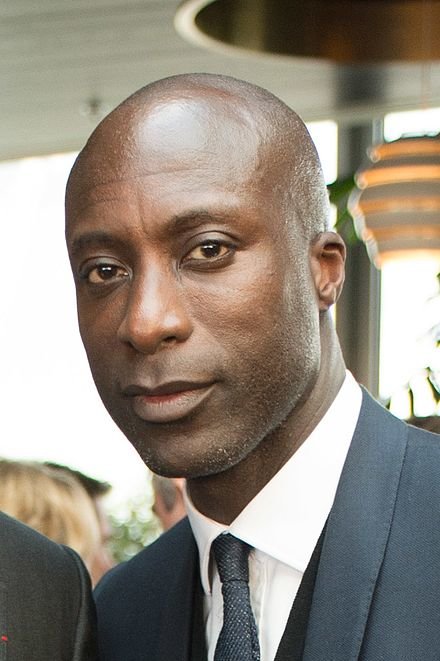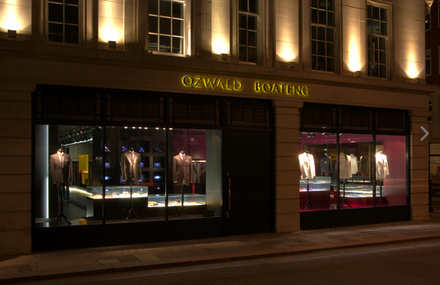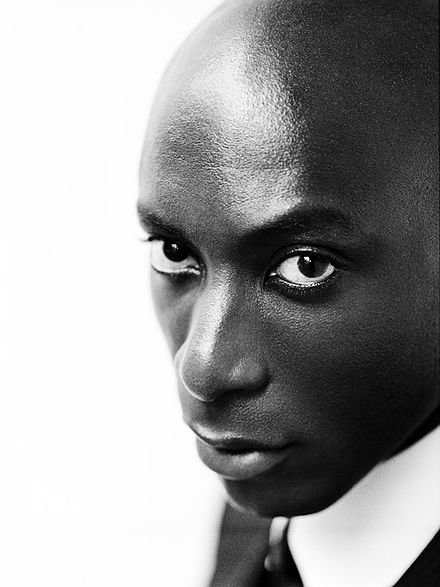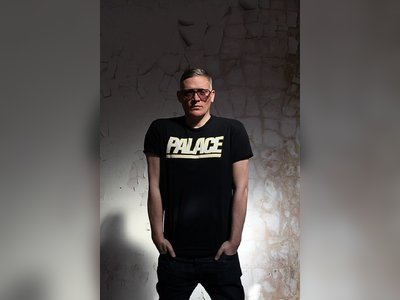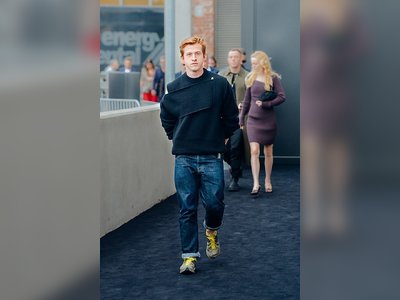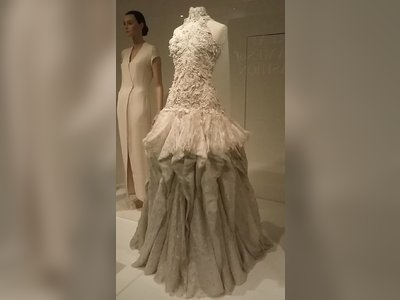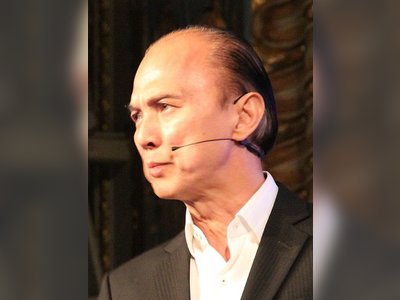British Heritage
Remember, Cherish, Learn.
beta
Ozwald Boateng - Bespoke By Design
A Luminary in British Fashion Heritage.
Ozwald Boateng, an iconic British fashion designer, is not just a part of British heritage; he is one of its trailblazers, reshaping the landscape of British and global fashion through his unconventional approach to classic tailoring and bespoke styles. His unique craftsmanship, combined with an unwavering commitment to cultural fusion, has earned him a unique place in the annals of British fashion history.
Boateng was born in the Muswell Hill district of London on 28 February 1967, to Ghanaian immigrants. His fascination with tailoring began early, inspired by the exquisite suits donned by his father and receiving his first purple mohair suit at the tender age of eight. These formative experiences ignited a passion for fashion that would come to define his life.
As a teenager, he found summer employment sewing linings into suits, a practical immersion into the world of sartorial elegance. His journey into design was sparked by his girlfriend during his tenure as a computer science student at Southgate College. He leveraged his mother's old sewing machine to craft and sell designs to his fellow students, marking the beginning of his journey into the world of fashion.
His nascent talent was noted when he helped design clothes for a friend's fashion show, earning him significant recognition and leading to his first collection being sold at a menswear store in Covent Garden. He opened his first studio in 1991 in Portobello Road, and by 1994 he was showcasing his designs at Paris Fashion Week, becoming the first tailor to stage a catwalk show in the city of lights.
Mentored by Tommy Nutter, Boateng's success in Paris provided the platform for his boutique on Vigo Street, the south end of Savile Row, in 1995. He brought a contemporary approach to menswear that ignited a newfound appreciation for Savile Row, attracting a younger demographic to the iconic fashion district. In 2002, Boateng fully moved his operations into Savile Row, marking a significant milestone in his career.
Boateng's legacy was further solidified when he was honoured with a major 20-year retrospective event at the Victoria and Albert Museum in 2005. In 2008, he launched his flagship store at No. 30 Savile Row, co-designed with British-Ghanaian Architect David Adjaye, marking it as the largest store on this historic street. It remains the only Black-owned store on Savile Row as of 2019.
Never one to rest on his laurels, Boateng expanded his brand in 2003 with the launch of a new fragrance for women, 'Bespoke', featuring two different vials of fragrance housed within a jewel-like bottle. He also extended his range to include two ready-to-wear collections each year, produced at the former Chester Barrie factory in Crewe, Cheshire.
Boateng's talent drew the attention of LVMH President Bernard Arnault, who appointed him as Creative Director of Menswear at Givenchy. His tenure at Givenchy saw him reinvent the French gentleman, with his first collection showcased in July 2004 at Hotel de Ville in Paris. Boateng parted ways with Givenchy after the Spring 2007 collection.
In 2004, Coutts bank commissioned Boateng to design a Super-Premium credit card, executed in his trademark imperial purple. That same year, Virgin Atlantic sought Boateng's expertise for their Upper Class amenity kits, which were hailed as the most stylish in any airline. His creative influence saw pick rates skyrocket.
In a testament to his African roots, Ghanaian President John Agyekum Kufuor asked Boateng to design a show at the 9th Annual African Union summit in 2007. In 2018, British Airways appointed him as the designer for their new uniforms as part of their centenary celebrations.
Boateng's influence extends to the world of film and television, where his bespoke designs have graced productions such as Mo' Better Blues, Tomorrow Never Dies, and Sex and the City. A fly-on-the-wall feature documentary, A Man's Story, released in 2012, followed his life from 1998 to 2010, providing an intimate view into his career and personal life.
Beyond the glitz and glamour of the fashion world, Boateng is a family man, with two children from his marriage to Azerbaijani fashion model Gyunel Taylor. His personal mantra, "If you flow with history and don't fight with it, eventually it becomes a dance," speaks volumes about his approach to life and his craft.
His philanthropic efforts are highlighted by his appointment to the REACH committee in 2008, a panel focused on raising the aspirations of black boys. He also co-founded the Made in Africa Foundation, a non-profit aimed at developing large-scale infrastructure projects in Africa.
Ozwald Boateng's life and career exemplify an extraordinary commitment to creativity, cultural fusion, and excellence. His groundbreaking contributions to fashion, particularly his rejuvenation of Savile Row, have solidified his legacy as a pivotal figure in British heritage. His journey, from a boy in Muswell Hill to a luminary in global fashion, underscores the immense potential that lies within all of us to shape our culture, traditions, and future.
Early Years and Foray into Fashion
Boateng was born in the Muswell Hill district of London on 28 February 1967, to Ghanaian immigrants. His fascination with tailoring began early, inspired by the exquisite suits donned by his father and receiving his first purple mohair suit at the tender age of eight. These formative experiences ignited a passion for fashion that would come to define his life.
As a teenager, he found summer employment sewing linings into suits, a practical immersion into the world of sartorial elegance. His journey into design was sparked by his girlfriend during his tenure as a computer science student at Southgate College. He leveraged his mother's old sewing machine to craft and sell designs to his fellow students, marking the beginning of his journey into the world of fashion.
His nascent talent was noted when he helped design clothes for a friend's fashion show, earning him significant recognition and leading to his first collection being sold at a menswear store in Covent Garden. He opened his first studio in 1991 in Portobello Road, and by 1994 he was showcasing his designs at Paris Fashion Week, becoming the first tailor to stage a catwalk show in the city of lights.
Reinventing Savile Row
Mentored by Tommy Nutter, Boateng's success in Paris provided the platform for his boutique on Vigo Street, the south end of Savile Row, in 1995. He brought a contemporary approach to menswear that ignited a newfound appreciation for Savile Row, attracting a younger demographic to the iconic fashion district. In 2002, Boateng fully moved his operations into Savile Row, marking a significant milestone in his career.
Boateng's legacy was further solidified when he was honoured with a major 20-year retrospective event at the Victoria and Albert Museum in 2005. In 2008, he launched his flagship store at No. 30 Savile Row, co-designed with British-Ghanaian Architect David Adjaye, marking it as the largest store on this historic street. It remains the only Black-owned store on Savile Row as of 2019.
Diversification and Collaborations
Never one to rest on his laurels, Boateng expanded his brand in 2003 with the launch of a new fragrance for women, 'Bespoke', featuring two different vials of fragrance housed within a jewel-like bottle. He also extended his range to include two ready-to-wear collections each year, produced at the former Chester Barrie factory in Crewe, Cheshire.
Boateng's talent drew the attention of LVMH President Bernard Arnault, who appointed him as Creative Director of Menswear at Givenchy. His tenure at Givenchy saw him reinvent the French gentleman, with his first collection showcased in July 2004 at Hotel de Ville in Paris. Boateng parted ways with Givenchy after the Spring 2007 collection.
In 2004, Coutts bank commissioned Boateng to design a Super-Premium credit card, executed in his trademark imperial purple. That same year, Virgin Atlantic sought Boateng's expertise for their Upper Class amenity kits, which were hailed as the most stylish in any airline. His creative influence saw pick rates skyrocket.
In a testament to his African roots, Ghanaian President John Agyekum Kufuor asked Boateng to design a show at the 9th Annual African Union summit in 2007. In 2018, British Airways appointed him as the designer for their new uniforms as part of their centenary celebrations.
Impact on Film and Television
Boateng's influence extends to the world of film and television, where his bespoke designs have graced productions such as Mo' Better Blues, Tomorrow Never Dies, and Sex and the City. A fly-on-the-wall feature documentary, A Man's Story, released in 2012, followed his life from 1998 to 2010, providing an intimate view into his career and personal life.
Personal Life and Philanthropy
Beyond the glitz and glamour of the fashion world, Boateng is a family man, with two children from his marriage to Azerbaijani fashion model Gyunel Taylor. His personal mantra, "If you flow with history and don't fight with it, eventually it becomes a dance," speaks volumes about his approach to life and his craft.
His philanthropic efforts are highlighted by his appointment to the REACH committee in 2008, a panel focused on raising the aspirations of black boys. He also co-founded the Made in Africa Foundation, a non-profit aimed at developing large-scale infrastructure projects in Africa.
Legacy
Ozwald Boateng's life and career exemplify an extraordinary commitment to creativity, cultural fusion, and excellence. His groundbreaking contributions to fashion, particularly his rejuvenation of Savile Row, have solidified his legacy as a pivotal figure in British heritage. His journey, from a boy in Muswell Hill to a luminary in global fashion, underscores the immense potential that lies within all of us to shape our culture, traditions, and future.
- Ozwald Boatengen.wikipedia.org
